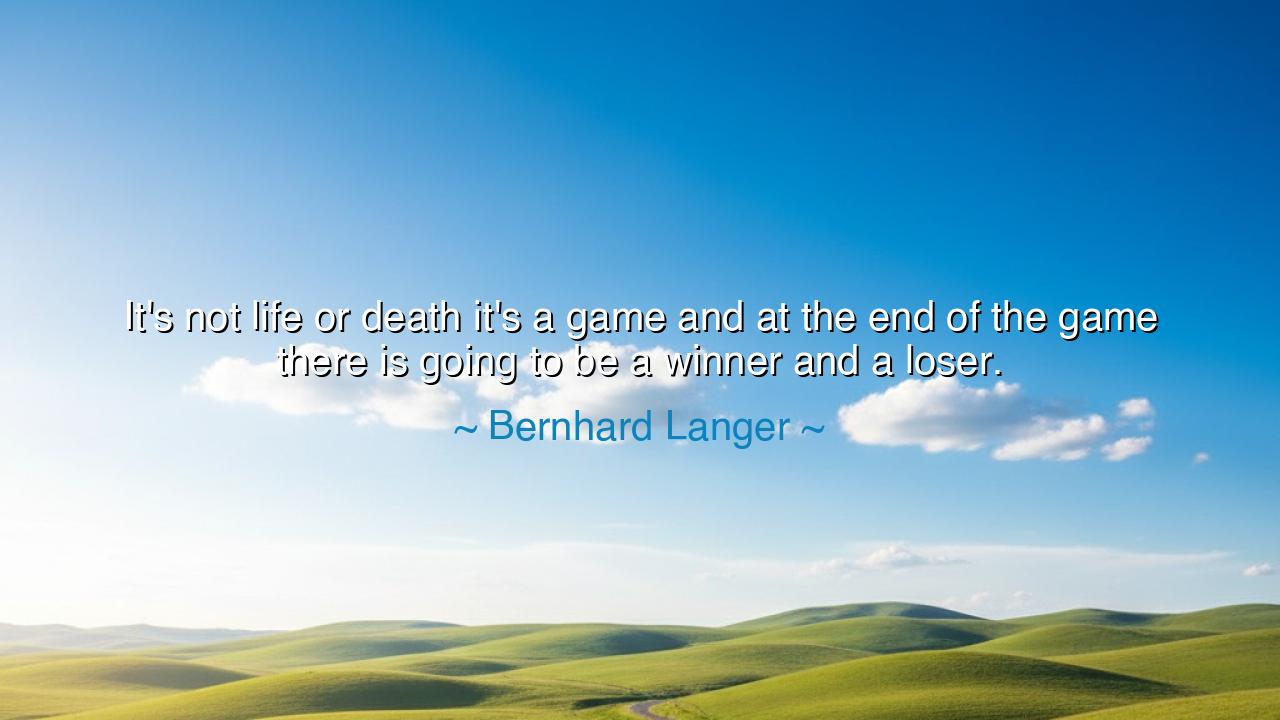
It's not life or death it's a game and at the end of the game
It's not life or death it's a game and at the end of the game there is going to be a winner and a loser.






In the calm and resolute words of Bernhard Langer, “It’s not life or death, it’s a game, and at the end of the game there is going to be a winner and a loser,” we find a wisdom that transcends sport and enters the realm of philosophy. These are not the words of one who dismisses the importance of effort, but of one who has learned to master perspective—the highest form of strength. In them, we hear the voice of a man who has walked through triumph and defeat alike, who has seen the fleeting nature of victory and the humbling touch of loss. His quote is both a reminder and a revelation: that to live wisely, one must learn the difference between what matters and what does not, between the field of play and the battlefield of the soul.
The meaning of his words lies in this balance. Langer, a champion of golf and a man of deep faith, understood that the spirit of competition can be noble when kept in proportion, but destructive when mistaken for life itself. To say “It’s not life or death” is to reclaim the heart from obsession—to remind ourselves that the outcome of any contest, no matter how grand, cannot define the worth of our being. In life, as in sport, there will be moments of triumph and moments of defeat, yet neither is final. The true victory lies not in the scoreboard, but in the mastery of self: in composure, grace, and the courage to keep playing even when fortune turns against us.
The origin of this insight is found in the ancient wisdom of balance and humility. The Stoics, centuries before Langer, taught that peace comes not from control of events, but from control of one’s reaction to them. Epictetus said, “It’s not what happens to you, but how you react to it that matters.” So too, Langer’s quote is an echo of that stoic virtue—detachment without indifference, passion without desperation. It is the teaching of one who knows that the game ends, and that the glory of the moment is not the measure of eternity. To understand this is to be truly free—to give your best without fear, to strive without being consumed by the need to win.
Consider the story of Roger Bannister, the man who first broke the four-minute mile. Before his record, the world believed it impossible; after it, countless others achieved it. But Bannister himself said, years later, that the moment of triumph was fleeting, and that his greater pride lay in balancing athletics with a life of healing as a doctor. He knew that the race was not life itself—it was an expression of it. His victory was not the time on the clock, but the courage to chase excellence without losing his soul. Langer’s words carry this same spirit: a reminder that the game is sacred, but not ultimate, and that the human being must remain greater than the moment.
There is also humility in his teaching. To acknowledge that “there will be a winner and a loser” is to embrace the reality of existence—duality, balance, and impermanence. The ancients called this the law of opposites: where there is light, there must be shadow; where there is victory, there must be defeat. To resist this truth is to live in torment; to accept it is to find peace. The wise do not see loss as failure, but as instruction. Every defeat is a mirror reflecting where we must grow, and every victory a reminder that we, too, are mortal. Langer’s words strip away the illusion of permanence and teach us to stand tall whether the crowd cheers or the silence falls.
At its heart, his quote is an invitation to perspective and gratitude. When the athlete learns that the game is not life or death, they play with freedom. When the worker, the artist, the dreamer learns the same, they labor with joy. For the pressure that crushes is often the one we create ourselves—the belief that everything depends on this single moment. But when we remember that life is larger than any contest, we reclaim our peace. The joy of effort, the beauty of striving, the grace of sportsmanship—these are the true victories that endure long after the trophies fade.
And so, dear listener, let this be the lesson: play the game, but do not let the game play you. Strive for greatness, but never at the cost of your soul. Whether you win or lose, rise each day with gratitude for the chance to take the field again. Let your victories make you humble, and your defeats make you wise. For life, like sport, is not about the final score—it is about the spirit with which you play. Bernhard Langer reminds us that courage is not found in winning every time, but in returning to the course with heart, ready once more to give your best. Remember always: it is not life or death—it is a game. Play it well, play it fully, and let it make you more human.






AAdministratorAdministrator
Welcome, honored guests. Please leave a comment, we will respond soon